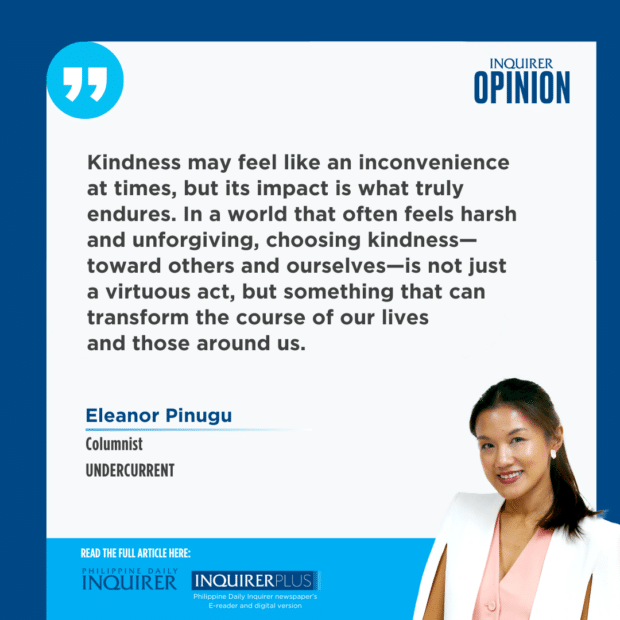
At the start of each school year, we bring together all the Mano Amiga scholars for an orientation, where they can listen to an inspirational speaker who helps set the tone for the year ahead. We were quite lucky that Boyet Dy, a former scholar and student leader who was also the summa cum laude and chosen class valedictorian of his college batch, agreed to join us and say a few words.
A bit about Boyet—he currently works with the Metrobank Foundation, overseeing programs focused on education, livelihood, and the arts. However, most people know him from his previous role as chief of staff to former vice president Leni Robredo. When he told me he wanted his speech to be about the importance of kindness, I couldn’t think of a better person to be our speaker or a better topic to share with our students.
The notion that kindness matters is not new. This is a virtue that parents and teachers hope to instill in children at a young age, and something we constantly admire and cherish in others. And yet, it is easy to believe that there is currently a huge deficit in kindness in the connected but increasingly polarized world we find ourselves in. Just this past few weeks, we have witnessed mothers and girlfriends being gamely pitted against each other and unfairly shaming an athlete based on erroneous speculations. On top of this, any dissenting opinion is often met with a barrage of hateful remarks. At times, it seems more automatic for people to relish being mean and hurtful over being kind.
As an educator, I sometimes find it challenging to teach kindness without sounding too preachy. While most young people believe that it is good to be kind, some also feel that choosing kindness could feel futile or even disadvantageous, especially when their kindness is neither repaid nor acknowledged. Last week, Boyet shared three points that he hopes will strengthen the case for choosing kindness, most especially when it is difficult to do so.
1. In the age of rapidly developing artificial intelligence, our capacity to show kindness is what sets us apart. At a time when majority of tasks can already be automated, Boyet highlighted that “our humanity is our superpower.” Our ability to empathize and put ourselves in another person’s shoes, have a better understanding of what their needs are, and respond with compassion—are qualities that machines can never replace or take away from us.
He also emphasized that recruitment officers are not just looking for proof of a candidate’s academic accomplishment and personal achievements; they are also looking for evidence of a person’s character. It is not just about getting the job; it is about being the kind of person others want to work with, and someone who adds value to the team beyond their technical abilities.
2. Luck is defined as people opening doors for you, and people are more likely to open doors for you if you are kind. In everyday interactions, we see the power of kindness to build bridges and deepen relationships that might otherwise be transactional. While reflecting on his own experiences, Boyet realized that he was able to accomplish many of the things he wanted to do because other people were willing to help him. The opportunities we receive often depend on the goodwill of others, and that goodwill is usually extended to those who show kindness and a willingness to help others in return. Kindness also attracts people who share your values, opening doors to collaborators, mentors, and like-minded peers. This connection can create a ripple effect, leading to unexpected opportunities and lasting success.
3. Be kind to yourself. The narratives we tell ourselves can dictate whether an experience could either be debilitating or empowering. Boyet shared how he never really knew his father. He had passed away when he was very young, and even then was already living with another family. Whenever he was asked why he was so interested in being a leader, Boyet said the only thing he really remembers about his dad was that during the wake, people kept sharing about how good of a leader he was. And so for Boyet, choosing to be a good leader felt like he was both honoring and getting to know his father better.
Nonprofit organizations like Mano Amiga largely run on people’s kindness. When someone decides to sponsor a child’s scholarship, they are taking a leap of faith and choosing to invest in a stranger’s potential, without any guarantee of “returns.” Whenever people ask me what has sustained my passion for this work after 16 years, it is truly the amazement I feel at the generosity of those who believe in our mission enough to give what they can to help our students succeed.
For those moments when it is a little more difficult to be kind, Boyet shared this beautiful piece of advice he got from Robredo: “Tune out the noise, focus on what matters, and do what needs to be done.” Kindness may feel like an inconvenience at times, but its impact is what truly endures. In a world that often feels harsh and unforgiving, choosing kindness—toward others and ourselves—is not just a virtuous act, but something that can transform the course of our lives and those around us.
eleanor@shetalksasia.com